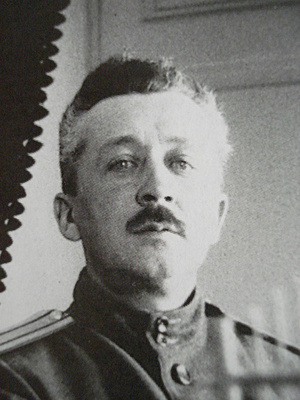#Klaudia Bitner
Text
OTMA's personalities according to Colonel Evgeny Stepanovich Kobylinsky
Kobylinsky is a fascinating inividual, here is a short summary of his life: Colonel Kobylinsky was employed by the Provisional Government and oversaw the Romanovs during their captivity in the Alexander Palace and Tobolsk. He was eventually replaced due to being viewed as not strict enough, and enabling their desires for activity and entertainment. Unusually, he went on to join the White Army in 1918, until he was captured and sent to a concentration camp. In order to escape the camp, he traded his freedom for a position in the Red Army. He eventually married Klavdia Mikhailovna Bitner, friend and tutor to OTMAA. Together they had one son. In 1927 he was accused of being part of a 'monarchical conspiracy' against the Soviet State and was executed by firing squad. Bitner was also arrested under a similar charge ten years later, and executed. Their son, Innokenty Evgenievich, was orphaned aged seventeen. He was drafted into the Red Army, and fought against the Nazi invasion.
"The Grand Duchess Olga was a nice looking young blonde, about twenty-three; her type was Russian. She was fond of reading, capable and mentally well developed; spoke English well and German badly. She had some talent for art, played the piano, sang, (she learned singing in Petrograd; her voice was soprano), and she painted well. She was very modest and did not care for luxury.
Her clothes were modest and she restrained her sisters from extravagance in dress. She gave altogether the impression of a good, generous-hearted Russian girl. It looked as if she had had some sorrows in her life and still carried traces of it. It seemed to me that she loved her father more than she loved her mother. She also loved her brother, and called him "The Little One" or "The Baby.
The Grand Duchess Tatiana was about twenty. She was quite different from her sisters. You recognised in her the same features that were in her mother — the same nature and the same character. You felt that she was the daughter of an emperor. She had no liking for art. Maybe it would have been better for her had she been a man. When the emperor and empress left Tobolsk nobody would ever have thought that the Grand Duchess Olga was the senior of the remaining members of the imperial family. If any questions arose it was always Tatiana who was appealed to. She was nearer to her mother than the other children; and it seemed that she loved her mother more than her father.
The Grand Duchess Maria was eighteen ; she was tall, strong, and better looking than the other sisters. She painted well and was the most amiable. She always used to speak to the soldiers, questioned them, and knew very well the names of their wives, the number of their children, and the amount of land owned by the soldiers. All the intimate affairs in such cases were always known to her. Like the Grand Duchess Olga, she loved her father more than the rest. On account of her simplicity and affability she was given the pet name by the family of "Mashka." And by this term she was called by her brother and by her sisters.
The Grand Duchess Anastasia, I believe, was seventeen. She was over-developed for her age; she was stout and short, too stout for her height; her characteristic feature was to see the weak points of other people and to make fun of them. She was a comedian by nature and always made everybody laugh. She preferred her father to her mother and loved Maria Nicholevna more than the other sisters.
All of them, including Tatiana, were nice, modest and innocent girls. There is no doubt they were cleaner in their thoughts than the majority of girls nowadays.
The czarevitch was the idol of the whole family. He was only a child and his characteristic features were not yet worked out. He was a very clever, capable and lively boy. He spoke Russian, French and English, and did not know a word of German.
In general, I could say about the whole imperial family that they all loved each other and were so satisfied with their family life that they did not need nor look for intercourse with other people. Never before in my life have I seen, and probably never again shall I see, such a good, friendly and agreeable family."



SOURCE: The Last Days of the Romanovs, published 1920, George Gustav Telberg, Robert Wilton, Nikolai Sokolov, ch. Examination of E. S. Kobylinsky
PHOTOS: Colonel Kobylinsky, dates unknown. Arrest photograph of Klavdia Mikhailovna Kobylinskaya, formerly Bitner, shortly before her execution
#Ipatiev House#Ekaterinburg#Alexander Palace#captivity#romanovs#OTMA#sources#descriptions#Olga Nikolaevna#Tatiana Nikolaevna#Maria Nikolaevna#Anastasia Nikolaevna#Colonel Kobylinski#Klaudia Bitner#Klavdia Bitner#Alexei Nikolaevich
70 notes
·
View notes